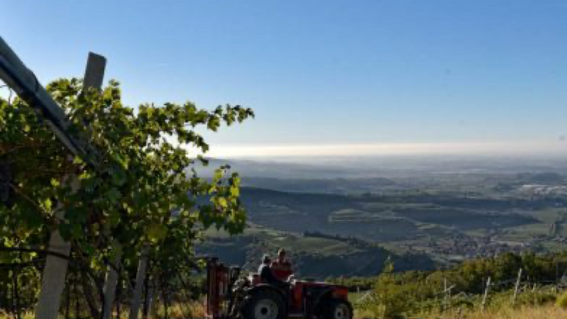
Degani
Veneto

About the Winery
Since the early 1900’s generation after generation of the Degani family have dedicated their efforts to growing grapes on this estate. It wasn’t until the 1970’s that they began producing and selling wine locally, and then in 1988 began international exportation.
Azienda Agricola Degani is still a family run operation, all activities from growing and picking of the grapes, to winemaking, bottling and selling are conducted by members of the Degani family.
Degani is the exception rather than the norm in the Valpolicella area – it’s a rarity to find such a boutique family-run operation that still grows, produces and bottles entirely from their own vineyards. With the retirement of father Sante Degani in 1980, the younger family members assumed responsibility. Still today, Aldo and Luca Degani handle the winemaking and Zeno Degani is responsible for the vineyards.
After some time their hard work started to be rewarded: starting in Italy from 1996, then beyond the Alps in Switzerland and Germany and finally also in the U.S!
Veneto
For almost 3,000 years, starting with the ancient Greeks, people have enjoyed wine made using grapes from Valpolicella. The Valpolicella viticultural area spans a considerable chunk of western Veneto, stretching north into the hills above Verona for approximately ten miles, and east to west for more than twice that distance, linking Soave with Bardolino. The hills here rise more than 600 meters (2000ft) into the fresh sub-alpine air, creating a patchwork of aspects facing in every direction and making the most of the northern Italian sunshine. Because standard Valpolicella wines have traditionally tended towards the lighter end of the spectrum, local winemakers have employed various techniques to achieve greater depth and complexity in their cuvees. Standard Valpolicella is quite different from the district's Ripasso, Amarone ("big bitter") and Recioto ("little ear") wines. The passito and ripasso methods have been so successful that both techniques now have dedicated DOC or DOCG designations. For a passito wine - Amarone or Recioto della Valpolicella DOCG - the grapes are dried out for weeks or even months prior to fermentation, during which time their natural sugars and flavors become sufficiently concentrated to produce deeper, more alcoholic wines. The Valpolicella Ripasso method - awarded DOC status in 2007 - is to "re-pass" (re-ferment) the passito grapes with standard Valpolicella wine, creating a deeper, more character-laden result. source:wine-searcher.com

Vineyard(s)
Ratings & Reviews
Title | Item | Vintage | Publication | Score | Review |
|---|---|---|---|---|---|
Degani | Valpolicella Classico 2023 | 2023 | 92 | Intense and vinous nose of strawberries, raspberries and pepper. The super-tense palate is crisp and tight, with chalky yet ripe tannins, a light to medium body and a savory, peppery finish. Drink now. | |
Degani | Valpolicella Classico 2022 | 2022 | 89 | Floral nose, offering violets and roses, together with ripe berries. Medium-bodied with a silky palate and a hint of powdery tannin at the end. Drink now. | |
Degani | Valpolicella Classico 2022 | 2022 | 91BB | Crushed red cherries, juice dripping down the cheeks and wild flower aromas permeate the glass of this red. Well balanced with fine tannins and zippy acidity that shines with raspberry and red currant flavors balanced by fresh herbs and black tea notes on the finish. | |
Degani | Valpolicella Classico 2022 | 2022 | 88 | Bright, medium deep ruby red; aromas of marascino and Queen Anne cherry; red poppy, thyme and a hint of allspice. Medium-bodied with good ripeness and good acidity; moderate, well-integrated tannins, restrained wood notes, good complexity. Well-made, this is a straightforward, very approachable Valpolicella to be enjoyed over the next 2-5 years. |










